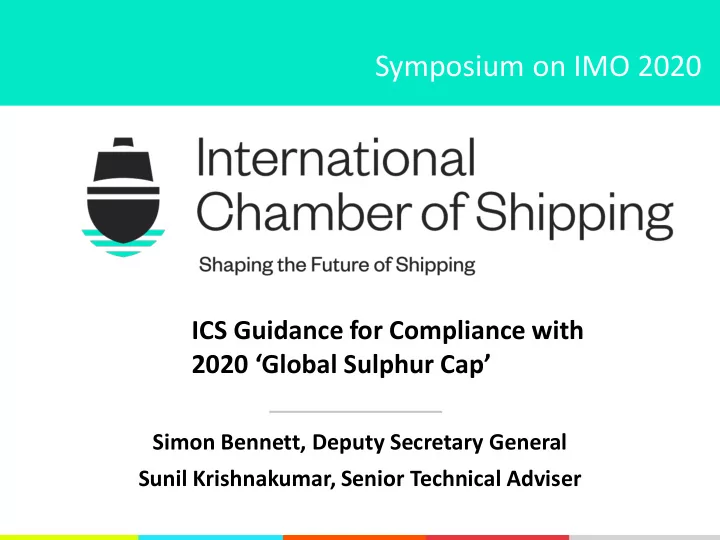

Symposium on IMO 2020 ICS Guidance for Compliance with 2020 ‘Global Sulphur Cap’ Simon Bennett, Deputy Secretary General Sunil Krishnakumar, Senior Technical Adviser
About ICS The global trade association for merchant shipowners and operators First shipowner NGO granted IMO consultative status (1961) Membership comprises world’s national shipowner associations, representing all sectors and trades and over 80% of world merchant fleet
IMO 2020 ICS and member national associations committed to making IMO 2020 a success: - First ICS Guidelines on Compliance published in September 2018 - Industry proposal for carriage ban of non compliant fuels to assist enforcement ICS pleased that IMO has adopted appropriate Guidelines to Member States that have addressed many (but not all) industry concerns Still major concerns about global availability of safe and compliant low sulphur fuels
The Final Countdown ICS confident that IMO 2020 will be a success Huge enormity of such a regulatory game changer never attempted before on a global scale ICS Guidance is intended to help shipping companies to do everything possible to prepare, including ship specific Implementation Plans Provided ships can demonstrate ‘good faith’, Port State Control should apply a ‘common sense’ approach during the early stage of implementation
2020 Implementation: The Shipowners’ Perspective Choosing method of compliance Preparing for the change Global availability of safe & compliant fuel Consistent and fair verification and enforcement by member States Maintaining level playing field
ICS Guidance on Compliance For ships choosing to comply using fuel oils with sulphur content of 0.50% m/m or less Updated to take account of latest IMO decisions Available free of charge via ICS web site
ICS Guidance on Compliance Selection of compliant fuel General properties and challenges related to different grades of fuel oil Preparing ship specific Implementation Plans (using IMO template) Guidance on bunkering procedures Fuel Oil Non Availability On board management of non-compliant fuel oil
Implementation Plans IMO Template provided as Appendix 1 to the ICS Guidance Intended to be generic; pick and choose to make it ship specific “ Once the Implementation Plan has been developed, shipping companies are recommended to approach the ship’s flag State and classification society and request that it reviews the Plan for adequacy and completeness or as deemed appropriate by the flag State.”
Implementation Plans Implementation Plans are not mandatory But ICS strongly recommends preparation (using ICS Guidance) Implementation Plan – supported by appropriate documentation – will demonstrate ‘ good faith’ that ship has done everything possible to comply in the event that safe and compliant fuel may not be available in every port worldwide Particularly important for ships in tramp trades!
Port State Control Implementation Plan will help address potential Port State Control issues immediately after 1 January 2020, in the event of ‘teething problems’ beyond the control of the ship operator IMO has agreed “ Administrations and Port State Control authorities may take into account the Implementation Plan when verifying compliance with the 0.50% sulphur limit requirement
Issues to be Addressed by Plan ICS Guidance provides advice on: Risk assessment and mitigation Fuel oil system modification and tank cleaning Procurement of compliant fuel oil Use of charter party clauses Fuel oil changeover plan Sampling arrangements Documentation and reporting
Bunkering Compliant Fuels ICS Guidance provides advice on: Segregation The MARPOL sample Laboratory analysis
Fuel Oil Non Availability Reports (FONARS) ICS Guidance makes clear: Ships are required to make every best effort to obtain compliant fuel oil FONAR will be last resort, and must be complemented by documentary evidence to justify use Before taking on non-compliant fuel, ship operators will need to consider potential consequences: non-compatibility, tank cleaning, debunkering , extra PSC inspections…
Summary To demonstrate ‘good faith’, companies must plan in advance and prepare ship specific Implementation Plans using IMO template Companies must involve all stakeholders (Flag State, Classification society, Charterers etc.) The Plan must be implemented Progress, obstacles and results must be recorded
Conclusions ICS confident that IMO 2020 will be a success Huge enormity of such a regulatory game changer has never been attempted before on a global scale ICS Guidance should help shipping companies worldwide to do everything possible to prepare And demonstrate ‘good faith’ with respect to compliance in the event safe and compliant fuels are not available through no fault of the ship
Recommend
More recommend